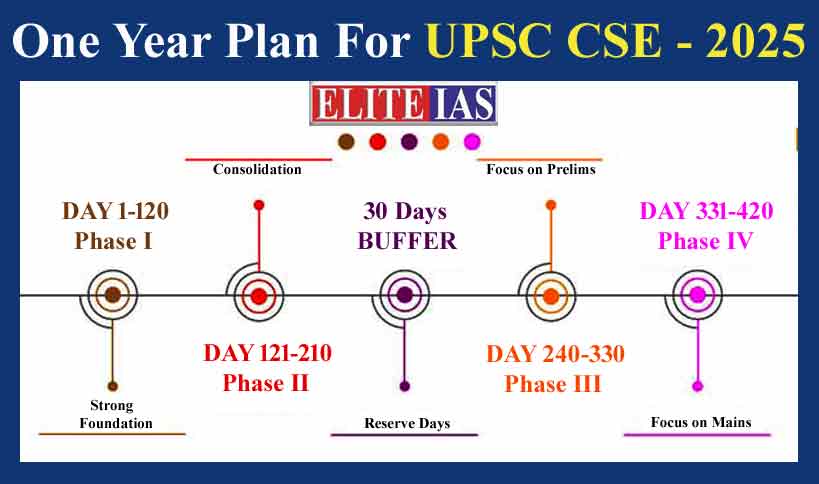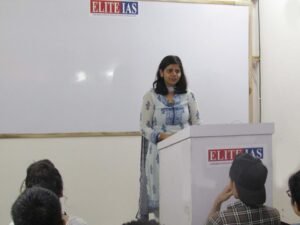
Preparing for the Union Public Service Commission (UPSC) exam requires meticulous planning and consistent effort over an extended period. Here’s a detailed breakdown of a one-year plan designed to help aspirants effectively prepare for both the Preliminary and Mains stages of the UPSC exam. Either you are joining any IAS coaching in Delhi or not, this plan will help you a lot in your UPSC preparation.
Phase 1: Day 1 – 120 (Strong Foundation)
Subject-wise Study:
The first step is to allocate time for each subject outlined in the UPSC syllabus, including History, Geography, Polity, Economy, Science & Technology, Environment & Ecology, and Current Affairs. Dedicate specific time slots for each subject, ensuring comprehensive coverage and an equal distribution of focus.
Basic Conceptual Understanding:
In order to really understand something, you need to start from the basics. This means taking the time to learn and fully grasp the core ideas of each subject. You can do this by using textbooks, reference materials, and online resources to help you when you’re stuck or confused. This stage is important because it sets the stage for understanding more complicated stuff down the line. So, by building a strong foundation now, you’ll be better prepared to tackle more challenging topics later on. If yet feeling problems in developing conceptual understand, it is rational to join best UPSC online coaching.
Practice Sessions:
Regular practice is crucial for reinforcing understanding and improving problem-solving skills. Engage in solving practice questions and quizzes relevant to each subject area. This active learning approach not only aids in retaining information but also strengthens analytical abilities essential for the exam. There are many test series for UPSC available online which includes sectional test along with full length test. If money is not the constraint, you should join them. With practice sessions you are better able to understand your progress.
Revision Strategy:
Allocate dedicated time for regular revision to ensure retention of information. Create concise notes summarizing key points and important facts from each subject. These notes serve as valuable resources for quick revision, helping to solidify understanding and recall during the exam.
Mock Tests and Assessment:
Start including practice exams in your study schedule to see how well you’re progressing and figure out where you need to improve. Look closely at how you do in these practice tests to find out what you’re good at and what you need to work on. This feedback is really helpful for tweaking your study methods and concentrating on the subjects or topics that need more work.
Phase 2: Day 121 – 210 (Consolidation)
In this phase, the emphasis is on consolidating the knowledge gained during the foundational phase and delving deeper into each subject. Key activities during this phase include:
You Can Read Also: How to Prepare for UPSC from Zero Level
In-depth Study:
This phase marks a transition from foundational learning to a deeper exploration of each subject. Dive into advanced concepts and topics within History, Geography, Polity, Economy, Science & Technology, Environment & Ecology, and Current Affairs.
Utilize a variety of resources such as advanced textbooks, specialized reference materials, and online courses to broaden your understanding. Engage with complex ideas and theories, fostering a more nuanced comprehension of the subjects.
Practice Papers:
Aspirants should start incorporating the practice of solving previous years’ question papers and sample papers into their study routine. This serves multiple purposes: familiarizing oneself with the exam pattern, refining time management skills, and gaining insights into the types of questions asked.
Analyze your performance in these practice sessions, identifying strengths and areas that require improvement. Adjust study strategies accordingly to address weaknesses and optimize preparation.
Current Affairs:
Staying updated with current affairs is essential for success in the UPSC exam. Allocate time each day to read newspapers, magazines, and reputable online sources covering national and international events. Make comprehensive notes of significant developments, issues, and debates relevant to the UPSC syllabus.
Additionally, utilize resources such as monthly current affairs compilations to ensure thorough coverage of contemporary issues.
Revision and Consolidation:
Regular revision remains a cornerstone of effective preparation during this phase. Continuously review your notes, revisiting important topics and concepts across all subjects. Actively engage with the material through regular practice sessions, solving practice questions, and revisiting challenging topics.
Consolidate your knowledge by connecting related concepts and reinforcing understanding through repetition. This iterative process of revision and consolidation ensures retention of information and strengthens mastery of the subjects.
You Can Read Also: Top 10 Tips for Students to Prepare for IAS Exam while in College
30 Days BUFFER (Reserve Days)
It is crucial to allocate 30 days as buffer or reserve days within the UPSC preparation schedule to accommodate unforeseen circumstances, emergencies, or additional preparation requirements.
These reserve days serve as a safety net, providing flexibility and room to manoeuvre in case of unexpected events that may disrupt the study routine. During these buffer days, aspirants should utilize their time wisely to address any pending topics, revise extensively, or take extra mock tests for practice.
This period offers an opportunity to consolidate knowledge, fill in any gaps in understanding, and further refine study strategies. By strategically allocating reserve days, aspirants can mitigate the impact of unexpected disruptions and ensure that they are well-prepared to face the challenges of the UPSC exam.
Phase 3: Day 240 – 330 (Focus on Prelims)
As the Preliminary exam approaches, shift your focus towards specific preparation for the Prelims. Key activities during this phase include:
Prelims-oriented Study:
Channel your efforts towards topics and subjects directly pertinent to the Preliminary exam syllabus. Prioritize subjects and areas that are frequently tested in this stage.
Dedicate time to revising essential facts, figures, and current affairs events that are likely to be part of the Prelims question paper. Stay updated with recent developments and focus on understanding their implications.
Mock Tests and Revision:
Engage in regular mock tests designed to mimic the format and conditions of the actual Prelims exam. These tests serve as invaluable tools for assessing your readiness and identifying areas that need improvement.
After each mock test, thoroughly analyze your performance. Identify patterns of errors and areas of weakness to target in your subsequent preparation sessions.
Emphasize continuous revision to reinforce your understanding and retention of crucial information. Focus on memorizing key facts, figures, and concepts that are frequently tested in the Prelims.
Revision of Fundamentals:
Allocate sufficient time to revise fundamental concepts across all subjects included in the Prelims syllabus. Ensure a comprehensive understanding of the core principles and theories, as they form the basis for more complex topics.
Identify areas where your grasp of fundamental concepts may be weaker and prioritize them in your revision schedule. Strengthening your foundational knowledge will enhance your overall preparedness for the Prelims exam.
Utilize various learning resources such as textbooks, reference materials, and online tutorials to reinforce your understanding of fundamental concepts. Adopt different study techniques to cater to your individual learning preferences and optimize retention.
Focusing on Prelims-CSAT:
Focusing on Prelims-CSAT (Civil Services Aptitude Test) necessitates a comprehensive understanding of the exam’s syllabus, emphasizing comprehension, logical reasoning, numerical ability, decision-making, and English language skills. Regular practice through mock tests and previous years’ papers is crucial to enhancing speed and accuracy.
Effective time management, prioritizing questions, and strengthening weak areas are essential strategies. Staying updated with current affairs and general knowledge is also vital. Additionally, taking mock tests for assessment and thorough revision before the exam significantly contribute to success in Prelims-CSAT.
Phase 4: Day 331 – 420 (Focus on Mains)
With the Preliminary exam completed, shift your focus towards the Mains exam preparation. Key activities during this phase include:
Mains-specific Study:
- Subject Allocation: With the Preliminary exam behind you, it’s time to redirect your efforts towards subjects pertinent to the Mains exam. Allocate more time to understanding and mastering topics such as Essay writing, General Studies Papers (I, II, III, IV), and your Optional Subject (if applicable). Dive deeper into these subjects by engaging with advanced study materials and resources.
- Advanced Study: Move beyond the basics and delve into more intricate aspects of the Mains syllabus. This might involve exploring scholarly articles, specialized books, and case studies relevant to your chosen subjects.
- Practice and Application: Rather than merely absorbing information, focus on applying your knowledge through practice. Solve complex problems, analyze case studies, and engage in discussions to reinforce your understanding and critical thinking skills.
Answer Writing Practice:
- Regular Practice: Set aside dedicated time for answer writing practice on a consistent basis. This involves simulating exam conditions as closely as possible and attempting a variety of questions from different subjects.
- Effective Structuring: Work on structuring your answers in a clear and organized manner. Start with an introduction, followed by coherent paragraphs that address specific aspects of the question, and conclude with a succinct summary or conclusion.
- Incorporating Content: Ensure that your answers are rich in relevant content, including facts, statistics, theories, and examples. Back up your arguments with credible sources to enhance the credibility of your responses.
- Feedback Mechanism: Seek feedback on your answers from mentors, teachers, or peers. Constructive criticism can help you identify areas for improvement and refine your writing style.
Essay Writing:
- Diverse Practice: Dedicate time to honing your essay writing skills by tackling essays on a wide range of topics. This will not only help you become more proficient in expressing your ideas but also expose you to different writing styles and approaches.
- Clarity and Coherence: Emphasize clarity of expression and coherence in your essays. Ensure that your arguments are logically structured and supported by evidence, and that your writing flows smoothly from one point to the next.
- Originality: Strive for originality of thought in your essays. Avoid clichés and strive to offer unique insights or perspectives on the given topic, which can set your essay apart from others.
Current Affairs Revision:
- Continued Engagement: Stay abreast of current affairs, particularly issues of national and international significance. Regularly read newspapers, magazines, and reputable online sources to stay informed about recent developments.
- Analytical Approach: Analyze the implications of current events on various subjects covered in the Mains syllabus. Consider how recent developments in politics, economics, society, and the environment might impact your understanding of key concepts and topics.
- Integration into Answers: Practice integrating current affairs into your answers, demonstrating your ability to apply theoretical knowledge to real-world situations. This not only enhances the relevance and depth of your responses but also showcases your analytical skills to the examiners.
At last, throughout the one-year UPSC preparation plan, aspirants should maintain a disciplined study routine, stay focused, and remain motivated. It’s essential to strike a balance between covering the syllabus comprehensively and practicing answer writing to ensure success in both the preliminary and mains exams. Additionally, seeking guidance from mentors, joining study groups, and staying connected with fellow aspirants can provide valuable support and encouragement throughout the preparation journey.



